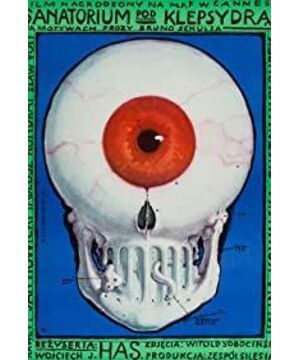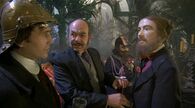This starts with the modern history of Poland. The film is adapted from Bruno Schultz's "The Sanatorium with the Hourglass as a Signboard", and also adds some fragments of Schultz's other novels. The author and director Haas are both Polish. Bruno Schulz, the great Polish writer, passed away in his forties. Influenced by Kafka, his creations are absurd and surreal, but different from Kafka - Kafka's works are more of existentialism, the absurdity and nothingness of the times - Shure In the expression of absurdity and nothingness, Ci's works also imply a deep nostalgia for the place where he was born, which can be seen from his novels such as "Motherland". The author's work is usually influenced by the times, so Schultz's emotions can be traced back to Poland's unsightly modern history, the history of divisions and integrations being embezzled and divided. Before the First World War, Poland was already in a state of being divided up. Russia, France, Prussia, etc., Poland's mainstream political parties were in exile abroad, and the rest of the country was a puppet regime. During World War I, the Poles hoped to recover the lost land through war, so they worked very hard, but the winning countries ignored Poland when they divided their interests, and did not give them their original land. It was not until the 1930s that Poland established a country with complete sovereignty, but it was soon betrayed by the powerful countries to Germany. During this period, many artists and politicians were exiled abroad and could not return to their own countries. It has to be said that these exiles have never forgotten this land, whether they are keen on political parades or literary and artistic creations, they all show a deep nostalgia. It is in such an environment that Schultz created a series of works, which not only express the nothingness brought about by the war, but also the inevitable reincarnation of human history. "The Sanatorium with the Hourglass as the Signboard" is like this. In the deep despair, it shows the desire to return to the homeland and the attachment to the complete country. Haas basically restored what Schultz meant. While Haas was born in Poland in the 1920s, he also has a sensitive identity: Jewish. The identity of Jews is not only despised by the Nazis, but the local people in Poland are not welcome to Jews, and they are excluded from all aspects. There is a profound historical tradition in this, and there is also resentment brought about by war. In addition, the establishment of the Second Republic after World War II and the loss of Poland's sovereignty under the Soviet Union were more vividly experienced by Hass than Schultz (Schultz died in 1942). So Haas should feel more nostalgic for his homeland than Schultz.
Returning to the film, Haas used Joseph's death to symbolize the death of Poland, used Joseph's transformation from a passenger to a conductor to symbolize the reincarnation of history, used his father to symbolize Poland itself, and used Joseph's memory fragments to show the modern history of Poland, showing the nothingness of existence. The fathers we see in the film are resurrected countless times and become young, all of which are showing us the destruction and rebirth of Poland, and this rebirth is often very short (Poland was divided three times in the 20th century, established three times and destroyed three times, and finally established the current Polish regime in the 1990s). The so-called time gap is nothing but a dream-like memory dominated by the unconscious, so it is not limited by time and space. The sanatorium symbolizes a place similar to "Wangxiang Terrace", where the dead look back on their lives, while the doctors and nurses in the sanatorium symbolize the messengers of hell in the "Wangxiang Terrace", where Joseph got off the car and reviewed own life. From the beginning of meeting Rudolph to the end of the assembly of "wax figures" to defeat the people who controlled these figures, and loudly declared that they would give up the regency and return the power to Rudolph. People of Righteous Nations around the world - Poland was established as a sovereign state shortly after World War II (1953?). Joseph also gave up his lover to Rudolf, and the "love" involved in it showed the hope that he was willing to give infinitely to his country. The prosperity of the father's store and the later desolation of the store both express this illusory history. The protagonist is wandering in this empty history. Many times he does not know what he is looking for, maybe it is the "father" he said. The mother often appears in front of Joseph in two images, young and old. Interestingly, when a young mother appears, it is often accompanied by a carnival—at first, Joseph climbed the ladder with everyone, and then the village had a collective meal, etc.; Older mothers are often accompanied by depression, such as in the attic, mothers complaining about shop assistants while working, and later abandoned shops and wars. The aging of the mother is also the aging of the country and the changes of the times. And "hatching the eggs" represents a kind of new hope, as the soldier said, it would be better for him to hatch by himself - each individual can only return to the homeland he longs for if he has hope. And there is definitely the inherent perseverance of the Poles, which is too similar to Tarkovsky's "Nostalgia". And finally, when Joseph went through a series of ups and downs and returned to the sanatorium to face the doctor again, he admitted the fact of "death", he admitted that "father" was indeed dead, and put on a conductor's suit and got up from the cemetery. As for whether he is going to extradite the next person or become a member of the dead, the film does not say, but everything in the film has told us this kind of despair in hope and hope in despair mixed emotions. So, like existentialism, we must admit the nothingness of existence, the absurdity and the negative side of our existence. And these acknowledgments are precisely what we show our attachment to existence, showing our strong "nostalgia".
The reincarnation of history cannot be asked, only to be accepted. Like Sisyphus pushing the stone, Camus used a cheerful attitude, why can't we?
View more about The Hourglass Sanatorium reviews







